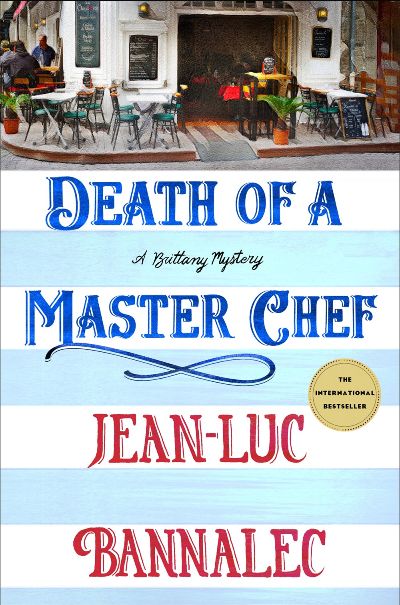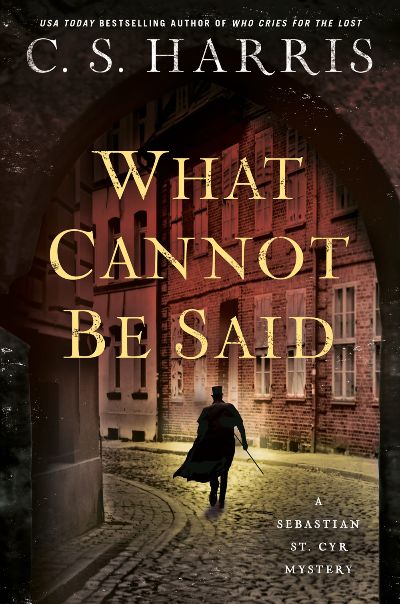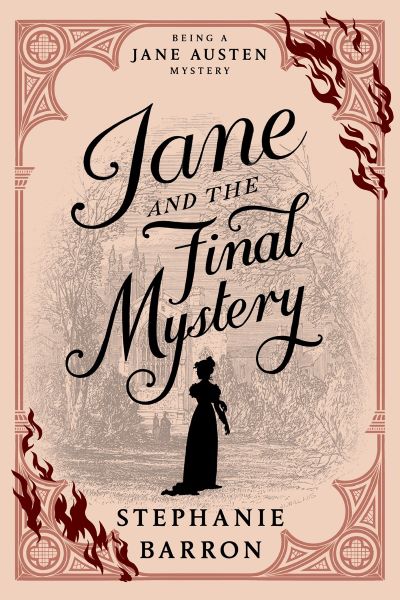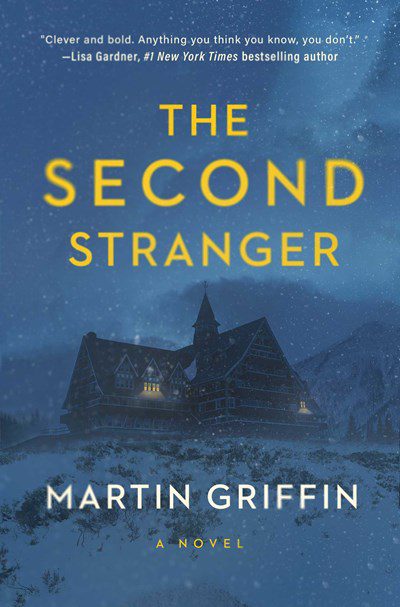In his ninth outing, Commissaire Georges Dupin is reluctantly attending a team-building police seminar with his officious boss in the Breton port city of Saint-Malo, in France’s northwest. The packed four-day schedule, however, offers the consolation of a restaurant visit every evening, and Dupin uses his lunch hour to explore “the culinary heart of Brittany.” As he samples cheeses and sausages in the market hall of Saint Servain, bloodcurdling screams capture his attention. A woman has been stabbed to death in one of the stalls. Dupin quickly gives chase to the fleeing culprit, even “borrowing” a car from a local resident before losing the object of his pursuit. When he returns to the police station, Dupin learns that both the victim and the murderer have been identified: Blanche Trouin, a well-known chef and owner of a Michelin-starred restaurant, was killed by her younger sister, Lucille, also a successful chef. The two had engaged in a sibling rivalry that could outshine the famous Joan Fontaine-Olivia de Havilland feud in its vicious bitterness. When Lucille is quickly arrested, she refuses to confess or discuss a motive. Although Dupin’s colleagues back in Concarneau advise him to stay out of the case, the murder of Blanche’s husband indicates a second killer is at work, and the seminar participants are quickly organized into investigative teams. As Dupin probes with his teammates, the caffeine-addicted sleuth makes time to enjoy petit cafés and savor the beauty of the Emerald Coast. Once again Bannalec (the pen name of German-born Jörg Bong) has written an intriguing and tasty mystery with surprising twists in a beautiful, charming setting that will appeal to Louise Penny fans. It is also a good starter for readers new to the series. Do not read the mouthwatering descriptions of Breton delicacies on an empty stomach!
Traditional
Eustacia Rose, Professor of Botanical Toxicology, lives alone in London with just her extensive but exquisite collection of poisonous plants for company. She tends to her rooftop garden with meticulous care, buys the occasional rare specimen off the black market, and, Rear Window-like, follows the goings on of her neighbors through her super-powerful telescope. She even records the neighbors’ activities, giving it all the veneer of science. Until one day she hears a scream coming from across the street that is so terrifying it forces her to shift from voyeur to participant. The woman who screamed was the remarkably beautiful Simone, as Rose has named her, and days later, when Rose sees Simone being shoved into a car and driven off by a group of men, she becomes obsessed with saving the woman. But does Simone need saving? A fascinating novel that brings together the cops, friends of Rose from years ago, the use of toxins from poisonous plants, lost love, the nature of friendship, and the effects of the death of a parent. In the end, we see Rose begin to emerge from her cocoon and reenter the world around her, a transformation hugely satisfying to watch.
Atonement and The Secret Garden float to mind as children in an isolated English idyll come upon a frightening scene. Out for a walk, two young brothers find a mother and daughter dead, posed in a way that’s so peaceful it’s sinister. Magistrate Sir Henry Lovejoy, a friend of the series’ main character, Sebastian St. Cyr, is called, and the scene is all too familiar to him: it’s how his wife and daughter were found murdered years before. A man was hanged for that crime. As more killings occur with frightening speed over the coming days, others speculate that a “copyist” is at work while Lovejoy fears that the wrong man was executed. Lady McInnis, the current day’s victim, was politically active, lending an intriguing angle to the story. She lobbied the government to improve the conditions of working children, some of whose sad lives are featured here; a side plot regarding workhouse babies being unscrupulously fostered for pay paints a grim portrait of early 19th-century England. In the end, the social elements and the murder mysteries knit well together to create a satisfying whodunit with a dash of historical fact.
Tempest Raj, a former magician, now runs Secret Staircase Construction, which, among other things, creates elaborate hidden passages behind bookcases. The more complex and baffling the construction the better. One of the company’s jobs is scrutinized when a woman falls down a secret staircase and almost dies. Tempest knows that the victim’s husband, Julian, set up the fall so he could sue Tempest’s company and avoid liability. One night, Julian calls Tempest to visit him at the historic Whispering Creek Theater, a venue recently purchased and upgraded by Tempest. She arrives to find Julian dead, with a sword through his chest. When a paramedic stumbles upon another blade that pops out one of the entrance doors, Tempest realizes the theater has been set with booby traps. Demanding answers, especially since the clues lead to questions about her past, Tempest will risk everything for the truth. Pandian creates a cast of characters that is straight out of the best cozy mysteries, and even though this is the third book in the series, the story is a perfect launch point for newcomers. The pacing and writing elevate A Midnight Puzzle to a must-read for the cozy mystery fan.
This is Estes’s debut novel, but far from her first brush with the TV journalism world portrayed in the book. Like her main character, Jolene Garcia, the author is a reporter in Phoenix, an Emmy winning one at that. Readers will get the feeling that she’s all too familiar with the pressure that’s on Jolene to do it all—investigate, write, present—all while looking fabulous on TV, then rinse and repeat on social media. Jolene is tired of the fluffy stories that the station runs to please the manager’s wife, and when a death occurs at a local radio station, she’s all over it. The deceased might be Alex Jones-alike Larry Lemmon, a talk-show host who divides his time between hating facts and hating immigrants more, a story that’s bound to draw viewers in droves. Dare she hope? And better again, maybe he was murdered. Her TV-news sensation dreams are fulfilled, but many questions remain. Assisting Jolene in getting the scoop on those is a reluctantly helpful police officer whose portrayal of departmental politics and ethics add narrative tension. But best is Jolene’s relentlessness and endurance of whatever it takes to get the story. Estes says that “J.A. Jance’s Ali Reynolds series planted the seed for my writing while Hank Phillippi Ryan’s Jane Ryland series helped it grow,” so fans of those series are a natural fit for this gritty thriller.
This new title from Delia Pitts—author of the Ross Agency series—offers everything that fans of detective fiction are looking for. Vandy Myrick, a former cop—she joined the force to impress her cop dad—is now a detective in Queenstown, New Jersey, her hometown, where she sets up a firm with BFF and trial lawyer Elissa. They’re two Black women in a town where racism, “casual like flip flops down the Jersey shore,” is always bubbling right under the surface. Vandy’s work is mainly divorce cases, and when she gets a call from the Mayor’s nephew—Queenstown royalty—asking her to track his wife, she just assumes that one more “Q-Town” marriage has hit the rocks. Except this gig quickly spins out of control when Vandy walks in on a double homicide, one that the powers that be are all too eager to shut down. Pitts has written a strong narrative that ricochets from Vandy’s tragic past to her gutsy present, keeping readers totally engaged to the very last page…and eager for more. Fans of Robyn Gigl’s thrillers will enjoy visiting New Jersey with Vandy.
Every flight headed to Italy should have on board a few dozen copies of Trinchieri’s mysteries—they are the perfect warm up to an Italian vacation, full of wry humor, eccentric characters, a gentle murder or two, plenty of excellent wine, and best of all a whole lot of Tuscan cooking. Ex-NYPD detective Nico Doyle moved to the small town of Gravigna after the death of his wife, a native, and he’s been embraced by the residents, even helping out in the kitchen of his in-laws’ ristorante (and getting great reviews). But he can’t leave his law enforcement years completely behind him, and he’s regularly summoned by Perillo, one of the local carabinieri, to help out on a case. Here, in the fourth installment, the murder victim is an older woman—owner of the handsome Villa Salviati—whose murder produces a bevy of possible suspects, including lovers, friends, and a couple of mean-spirited daughters. Will Nico and Perillo ever be able to return Gravigna back to more tranquil days? A delight from start to finish.
In March of 1817, Jane Austen is struggling to complete her latest manuscript, The Brothers, in spite of her declining health: “I, who enjoyed a riotous constitution throughout my four decades, had felt so little like myself in the previous twelvemonth that I found it hard to remember being free of pain.” But when the 15-year-old son of her widowed friend Elizabeth Heathcote (whose brother once proposed to Jane) is accused of the drowning death of a senior classmate at the prestigious Winchester College boys’ boarding school, she summons the energy to travel to Winchester with her beloved 19-year-old nephew, Edward, to investigate. There, she learns from Elizabeth that for the past three years, William had been the “subject of relentless attacks on his spirit, his mind, and his standing in the world.” He had been especially bullied by the sadistic late Arthur Prendergast, who enjoyed hazing the younger boys. Is there a connection between Prendergast’s murder, the malicious campaign against William, and an entailed inheritance that would benefit William? Jane is determined to clear William’s name before she succumbs to her illness. Over the course of 14 books, the multitalented Barron, who also pens spy thrillers as Francine Matthews, has brilliantly combined authentic historical and biographical details with skillful plotting and a credible evocation of Austen’s wry, distinctive voice. She brings the English author’s final investigation to a poignant, unforgettable close. Fans of this historical series will not be disappointed, and kudos to Barron’s excellent double-entendre title. While the earthly crime may be solved, the final mystery is one that we all will face.
No sooner does San Francisco bookbinder Brooklyn Wainwright get a break from sleuthing at a Scottish castle than she’s invited back to Scotland for a wedding and must again save the day. On Christmas Eve, Brooklyn gets a call announcing that her friends Claire and Cameron—Laird McKinnon, thank you—are getting married in a week. Brooklyn, her partner, and her parents are soon off to Castle McKinnon, on the shore of Loch Ness. At first only Brooklyn’s (meticulously described) book-restoring skills are in demand, as the bride-to-be wants a precious volume from the castle’s extensive library repaired for her beau. Then Claire also confides that 12 books, all of them set at Christmas and some very valuable, are missing from the shelves. But that investigation soon takes a back seat as a young man who works at the castle is found dead, not the last to meet a sad end. There’s a lot packed in here, from yummy food descriptions (there might also be a drink or two) to a family whose members are intent on grabbing a noble title and from archery competitions to Scotland’s Hogmanay traditions. It all comes together beautifully to create an atmospheric puzzle that fans of the author and newcomers will find festive and engaging.
An incredibly taut “locked inn” suspense novel that features just a handful of characters over an intense eight hours. We’re in a small hotel in the Scottish Highlands with a blizzard raging. It’s incredibly remote, and the only other sign of life is Porterfell, a prison far in the distance. It’s Remie Yorke’s last night managing the hotel—not that there is that much to manage with just two guests, one of whom has disappeared. In the morning, Remie will be on her way to Chile with no plans to ever return to Scotland. Meanwhile, the hotel grows even more isolated as the roads shut down and phone lines and internet access die. Suddenly a police officer, Don Gaines, appears. Beat-up, he claims to have been in an accident transporting a prisoner from Porterfell—a dangerous prisoner who’s now on the loose. Gaines goes about securing the hotel, when another officer shows up claiming to be Officer Don Gaines. He’s just as convincing, with the appropriate identification. Will the real Donald Gaines please stand up? Lest it seems as though I’m sharing spoilers, be assured that this is just the beginning. There’s plenty more to be revealed in this absolute nail-biter of a thriller.










